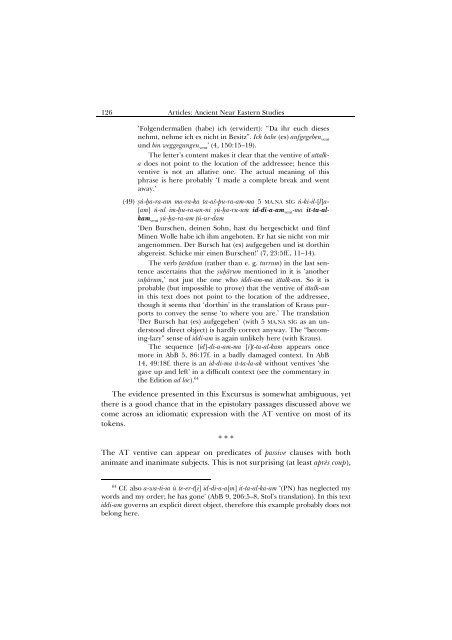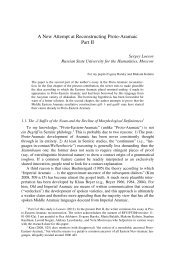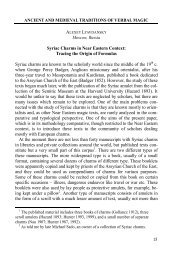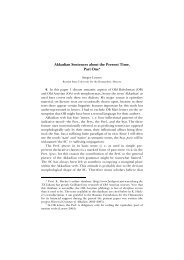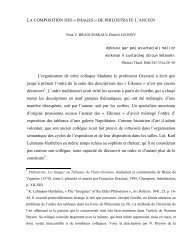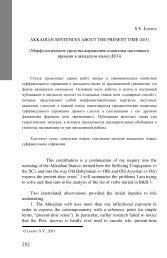Marginalia on the Akkadian Ventive*
Marginalia on the Akkadian Ventive*
Marginalia on the Akkadian Ventive*
You also want an ePaper? Increase the reach of your titles
YUMPU automatically turns print PDFs into web optimized ePapers that Google loves.
126 Articles: Ancient Near Eastern Studies<br />
‘Folgendermaßen (habe) ich (erwidert): “Da ihr euch dieses<br />
nehmt, nehme ich es nicht in Besitz”. Ich habe (es) aufgegeben vent<br />
und bin weggegangen vent’ (4, 150:15–19).<br />
The letter’s c<strong>on</strong>tent makes it clear that <strong>the</strong> ventive of attalka<br />
does not point to <strong>the</strong> locati<strong>on</strong> of <strong>the</strong> addressee; hence this<br />
ventive is not an allative <strong>on</strong>e. The actual meaning of this<br />
phrase is here probably ‘I made a complete break and went<br />
away.’<br />
(49) ´ú-a-ra-am ma-ra-ka ta-aš-pu-ra-am-ma 5 MA.NA SÍG ú-ki-il-[l]a-<br />
[am] ú-ul im-u-ra-an-ni ´ú-a-ru-um id-di-a-am vent-ma it-ta-alkam<br />
vent ´ú-a-ra-am ¢ú-ur-dam<br />
‘Den Burschen, deinen Sohn, hast du hergeschickt und fünf<br />
Minen Wolle habe ich ihm angeboten. Er hat sie nicht v<strong>on</strong> mir<br />
angenommen. Der Bursch hat (es) aufgegeben und ist dorthin<br />
abgereist. Schicke mir einen Burschen!’ (7, 23:5ff., 11–14).<br />
The verb ¢arādum (ra<strong>the</strong>r than e. g. turrum) in <strong>the</strong> last sentence<br />
ascertains that <strong>the</strong> ´uārum menti<strong>on</strong>ed in it is ‘ano<strong>the</strong>r<br />
´uārum,’ not just <strong>the</strong> <strong>on</strong>e who iddi-am-ma ittalk-am. So it is<br />
probable (but impossible to prove) that <strong>the</strong> ventive of ittalk-am<br />
in this text does not point to <strong>the</strong> locati<strong>on</strong> of <strong>the</strong> addressee,<br />
though it seems that ‘dorthin’ in <strong>the</strong> translati<strong>on</strong> of Kraus purports<br />
to c<strong>on</strong>vey <strong>the</strong> sense ‘to where you are.’ The translati<strong>on</strong><br />
‘Der Bursch hat (es) aufgegeben’ (with 5 MA.NA SÍG as an understood<br />
direct object) is hardly correct anyway. The “becoming-lazy”<br />
sense of iddi-am is again unlikely here (with Kraus).<br />
The sequence [id]-di-a-am-ma [i]t-ta-al-kam appears <strong>on</strong>ce<br />
more in AbB 5, 86:17f. in a badly damaged c<strong>on</strong>text. In AbB<br />
14, 49:18f. <strong>the</strong>re is an id-di-ma it-ta-la-ak without ventives ‘she<br />
gave up and left’ in a difficult c<strong>on</strong>text (see <strong>the</strong> commentary in<br />
<strong>the</strong> Editi<strong>on</strong> ad loc). 64<br />
The evidence presented in this Excursus is somewhat ambiguous, yet<br />
<strong>the</strong>re is a good chance that in <strong>the</strong> epistolary passages discussed above we<br />
come across an idiomatic expressi<strong>on</strong> with <strong>the</strong> AT ventive <strong>on</strong> most of its<br />
tokens.<br />
* * *<br />
The AT ventive can appear <strong>on</strong> predicates of passive clauses with both<br />
animate and inanimate subjects. This is not surprising (at least après coup),<br />
64 Cf. also a-wa-ti-ia ù te-er-t[i] id-di-a-a[m] it-ta-al-ka-am ‘(PN) has neglected my<br />
words and my order; he has g<strong>on</strong>e’ (AbB 9, 206:5–8, Stol’s translati<strong>on</strong>). In this text<br />
iddi-am governs an explicit direct object, <strong>the</strong>refore this example probably does not<br />
bel<strong>on</strong>g here.


